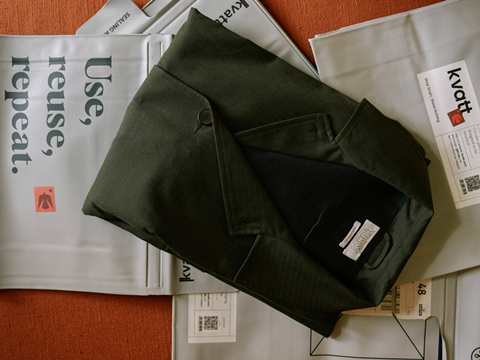
Clothing company TOAST has teamed up with Kvatt, a start-up seeking to reduce single-use packaging waste in e-commerce, to pilot Kvatt’s reusable packaging solution for UK customers.
According to Kvatt founder Gianfranco Bächtold, through its service customer’s TOAST items are delivered in a returnable mail bag with instructions. To return the bag, the customer needs to attach the prepaid label to the back and drop the empty packaging in any UK post box. Once it arrives at Kvatt’s facility, the packaging is sorted, cleaned, and can be reused up to 10 times.
Kvatt’s reusable mailer bags are designed to be visually appealing and durable. Each one is named ‘Charlie’, aiming to personalise the experience. When a ‘Charlie’ reaches the end of its life as a mailer, it’s sent to Kvatt’s third-party partner to be transformed into a road cone.
The company says users will soon be able to scan a code to follow their mailer’s journey, to see how many times it’s been reused and the stops it’s made across the UK. The small charge for Kvatt’s service reportedly covers the cost of returns logistics and cleaning and refurbishing the packaging for reuse. Kvatt states that around 70% of customers who opt-in follow through with returning the bag, so the contribution helps to offset the 30% who do not.
The pilot programme currently only allows TOAST orders with two or fewer items to be sent in reusable packaging, but the clothing company plans to continue collaborating with Kvatt to broaden the service in future.
In similar news, last year children’s clothing brand Brave Kid teamed up with Movopack to introduce reusable packaging for its online orders, said to potentially cut CO2 emissions by 75%. The packaging is customized with the tagline “Be a BRAVE KID too! Send back the packaging” designed to engage children and encourage more responsible behaviours.
At the start of this year, DPD Germany announced a partnership with hey circle to utilize its reusable shipping boxes and bags, said to reduce waste and last for 50 cycles. Businesses can rent or purchase the bags and boxes, the goods are packed, a return label is included, and the packaging is sealed with a zipper and security seal.
If you liked this story, you might also enjoy:
The ultimate guide to the Packaging and Packaging Waste Regulation in 2025
How are the top brands progressing on packaging sustainability?
Everything you need to know about global packaging sustainability regulation in 2025
The key to increasing the use of reusable packaging in supermarkets














No comments yet